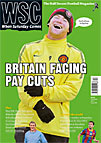 With the release of two new Alex Ferguson biographies, Barney Ronay assesses the need for more literature on the prolific manager
With the release of two new Alex Ferguson biographies, Barney Ronay assesses the need for more literature on the prolific manager
For those with an interest in documenting the career of English football’s reigning managerial titan, the last few weeks will no doubt go down as another moment of headline significance, and for one or two, of happy synchronicity. The Rooney episode coincided with the publication of two major new Ferguson biographies, Frank Worrell’s Walking in a Fergie Wonderland and Patrick Barclay’s Football – Bloody Hell!, the latter, with its attendant heavy flow of plug-related activities, the more high profile.
The first question that springs to mind on contemplating Football – Bloody Hell’s 463 hardback pages is: do we really need another book about Alex Ferguson? This is posed in a spirit of genuine inquiry. Eight Ferguson biographies have been published in the 12 years up to and including this one, while no doubt the forthcoming tomes Youse Are All Idiots! and When An Italian Tells Me It’s Pasta are already being punched out on the laptops of football writers as yet unannounced. It is tempting to wonder what fresh mysteries there are left to unravel in a professional life already relentlessly documented and, latterly, led beneath the trivia-hoovering gaze of the 24-hour rolling news era.
There is really only one Ferguson book waiting to be written: the Ferguson book to end all Ferguson books. And short of Hugh McIlvanney – sports-writing eminence and, more importantly, Ferguson’s close friend – Barclay is perhaps the man best qualified to cap the canon. Barclay is one of football journalism’s old-school big beasts, a muscular presence on the page and senior enough in his field to be beyond intimidation by the task. He is also a Scot and therefore immune to the appeal of frothing passages about “fiery Govan shop stewards” and the like – in the early pages Barclay points out how casually insulting to the everyday people of Govan is the customary assumption that Ferguson’s own short fuse is somehow geographically inevitable.
Football – Bloody Hell! may be burdened with a title only a particularly stubborn publisher could love, but it is an energetically researched and expertly told life. There is plenty of detail, third-party testimony and a partial – although not complete – willingness to put professional proximity to the manager of Manchester United aside and expose the claws. But still… the shadow of McIlvanney, the man who really could write the unseen life, stalks its pages.
What we crave is not the news that Ferguson has a quick temper and has won a lot of trophies, but fresh scrapings from the inside. Barclay has a nice anecdote near the start about Ferguson’s chastening level of concern for a mutual friend in ill health. You crane forward hoping for more. But it doesn’t really come, and instead we must content ourselves – no great hardship – with a spunky and muscular read that shades the relevant boxes with some style, with the chapters on Aberdeen probably the freshest, and therefore most interesting, part.
You might choose to object to Barclay’s insertion of his own journalistic presence within the text (“Only 20 years later did I realise… a few of us entertained the notion then”) although in fairness this seems fitting – in a kind of post-modern narrative sense – for a footballing life lived almost entirely through and around the refracting eye of the football media. You might also object that Football – Bloody Hell! falls slightly between two stools. Barclay is quick to point out that he is no personal friend of Ferguson, but there is still a professional kindliness at times where a writer beyond the immediate circle of his subject might have been a little more belligerent.
Instead what Barclay has is unmatched professional access, which is thoroughly mined. Barring McIlvanney’s as-yet-unwritten-warts-and-all hatchet job, the meticulous and vivid detailing of Football – Bloody Hell! is probably the next best thing. Whatever private side Ferguson may have managed to squirrel away beyond the daily intrusions of the last 20 years isn’t to be found here. But do we really want it anyway? Perhaps in the end, for all the flurry of biographical type, the only view of Ferguson that really matters is the one that is most readily available, his thoroughly documented and ongoing acting-out of the role of Manchester United manager.
From WSC 286 December 2010